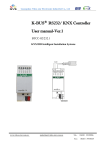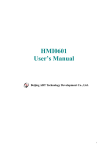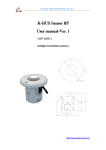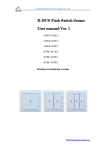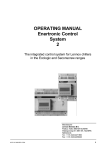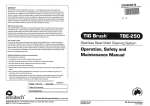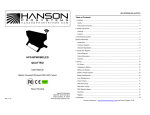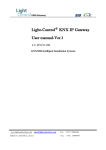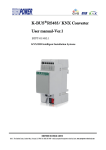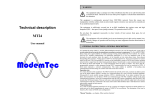Download RS232/ KNX Controller User manual
Transcript
Guangzhou Video-Star Electronics Co.,Ltd.
RS232/ KNX Controller
User manual-Ver.1
BTCC-02/232.1
http://www.video-star.com.cn
GVS
K-BUS
KNX/EIB
RS232/KNX Controller
Contents
1.
Summary ---------------------------------------------------------------------------------------------------------------------- 3
2.
Technical Properties & Dimension and Circuit Diagram ---------------------------------------------------- 4
2.1 Technical data --------------------------------------------------------------------------------------------------------------- 4
2.2 Dimension diagram -------------------------------------------------------------------------------------------------------- 5
2.3 Circuit diagram ------------------------------------------------------------------------------------------------------------- 5
3.
4.
Parameter setting description for the ETS ------------------------------------------------------------------------ 6
3.1.
Parameter window ―General‖ ------------------------------------------------------------------------------------- 6
3.2.
Parameter window ―COM1/2Setting‖ -------------------------------------------------------------------------- 7
3.3.
Parameter window ―Telegram setting page‖ ------------------------------------------------------------------ 8
3.4.
Parameter window ―Serials setting page‖ -------------------------------------------------------------------- 11
Description of communication objects ---------------------------------------------------------------------------- 14
2
GVS
K-BUS
KNX/EIB
RS232/KNX Controller
1. Summary
The RS232/ KNX Controller is designed for an intelligent building control system,which is
used to connect RS232 devices to KNX installation. As an interface device, it supports point to
multipoint one-way communication and its maximum communication distance is 15m. The
KNX/EIB bus control system can send a telegram to the RS232/ KNX Controller, and then transfer
to the RS232 devices by the Controller. The control commands and the technical data are different
from different devices with serial port, so you must know its commands and technical data, such as
the baud rate etc, before configuring it. It is the only way that the relevant parameters can be set
correctly for the RS232/ KNX Controller.
The RS232/ KNX Controller has two serial ports, they are called COM1 and COM2. It uses
nonstandard connection, and each serial port only keeps three signal wires to achieve communication.
The three signal wires are TxD, RxD and GND. The current version of the RS232/KNX Controller
does not use RxD, only allow one-way communication via TxD and GND, and allow the cables to
parallel in a serial port to control several devices.
The functions of the RS232/ KNX Controller are summarized as follows:
Two serial ports with three wires, nonsupport flow control, and only support one-way
communication.
The two serial ports are independent, the length of data is fixed for 8bits, and stop bits and
parity can be set individually.
Support up to 64 serial port control commands which length could be up to 64 bytes and the
baud rate and the COM port can be set individually.
Up to 16 communication serials can be set, and each serial provides up to 6 control commands
which could be sent to RS232 devices via COM1 or COM2.
Each serial can be triggered via 1bit or 1byte communication object.
This manual provides the technical information about the RS232/ KNX Controller as well as
assembly and programming in detail for users, and explains how to use the Controller by the
application examples.
The RS232/ KNX Controller is a modular installation device. It can be installed in the
distribution board on the 35 mm mounting rails according to EN 60 715. The device adopts screw
terminal to achieve connecting with other devices with serial port, use EIB bus connection terminals
to connect to the KNX/EIB system, and no need an extra voltage supply.
The RS232/ KNX Controller is able to use the Engineering Tool Software ETS (ETS3 or later)
which can import a VD4 files to allocate the physical address and set the parameters.
3
GVS
K-BUS
KNX/EIB
RS232/KNX Controller
2. Technical Properties & Dimension and Circuit Diagram
2.1 Technical data
Power supply
Operating voltage
21-30V DC,via the EIB bus
Current consumption
<12mA
Power consumption
<360mW
Outputs
Two serial ports with three lines, RxD, TxD, GND
Connections
EIB / KNX
1channel
Bus connecting terminal (black/red)
RS232 Interface
screw terminals
Wire range
Single-core 0.2—6.0mm2
Multi-core 0.2—4mm2
Operating and
Red LED and push button
For assignment of the physical address
display
Green LED flashing
Indicate the device running well
Temperature range
Operation
–5 °C ... + 45 °C
Storage
–25 °C ... + 55 °C
Transport
– 25 °C ... + 70 °C
Ambient condition
Humidity
<93%, except dewing
Design
Modular installation device,on 35 mm Din rail
Baud rate
1200~115200 bps
Transmission range
< 15m
Working mode
one-way communication
Dimensions
90×36×64mm(H×W×D)
Weight
0.1kg
Application program
RS232/KNX controller
Max. number of
Max. number of
Max. number of
communication objects
group addresses
association addresses
83
150
150
4
GVS
K-BUS
KNX/EIB
RS232/KNX Controller
2.2 Dimension diagram
2.3 Circuit diagram
① Programming button
② Red LED for assigning the physical address, green LED flashing for display the application layer works well.
③
KNX / EIB bus connection terminals
④ RS232 serial ports connection terminals
5
GVS
K-BUS
KNX/EIB
RS232/KNX Controller
3. Parameter setting description for the ETS
3.1. Parameter window “General”
The parameter window “General” is shown in fig. 3.1. Here can be set whether to enable the
serial ports of the RS232/KNX Controller and define the format of the control command. When the
serial ports are enabled, but the control command is not activated or configured, the telegram that the
serial port object receives is invalid. At the meantime, the command that is configured in the
parameters must be the same as the command that the control device requires. Here also gives the
notes of the format of control command and the download times.
Fig.3.1 parameter window ―General‖
Parameter “COM1/2 enable”
This parameter is used to enable the serial port COM1/2. Options:
Disable
Enable
If selecting the “enable” option,the parameter window “COM1/2 Setting” will be visible (as
shown in fig3.2) , and the object “Telegram send via COM1/2” will be also visible.
Note: When the serial ports are enabled, but the control command is not activated or
configured in the parameter window “Telegram setting page”, any values that the serial port object
“Telegram send via COM1/2” receives are invalid.
6
GVS
K-BUS
KNX/EIB
RS232/KNX Controller
If the parameter window “Telegram/serials setting page” has configure the control command,
but the COM that connect with the controlled RS232 device is not enabled, the control command can
be also not transmitted to the RS232 device successfully.
If the serial port that is configured in the parameter is not consistent with the port connect to
the controlled RS232 device, transmission of control command will also fail.
Parameter “Flag for EEPROM check, don’t care”
This parameter notes the flag of the EEPROM check. After the application program is
downloaded completely, the EEPROM is signed for FLASE. User doesn’t need to care this
parameter.
Parameter “Syntax check”
This parameter notes syntax check is enable, so you must input the control command in strict
accordance with the prescribed format. The command format is described in the following
parameters.
Parameter “Specify separator of the telegram”
This parameter is used to define the separator of the control command. Options:
Space
None
If you enter a control command in fig.3.3, according to the options, the input format can have
three types: “0D-2A-70-6F-77-3D-6F-6E-23-0D;”,“0D 2A 70 6F 77 3D 6F 6E 23 0D;”or
“0D2A706F773D6F6E 230D;”,the command must ends with a semicolon (;).
Parameter “The HEX Codes must have the format of {XX-XX-XX… …}, X=[0-9, a-f, A-F]”
This is a note about the code of the control command. It is composed of hexadecimal code, and
the HEX codes must have the format that is described in above parameter ―Specify separator of the
telegram‖.
Parameter “The HEX Codes must be ended with the symbol of;”
This is a note that the control command (HEX Codes) must be ended with the symbol “;”.
Parameter “A new programming of device will cost a few seconds to restart”
This is a note that download the application program will take a few seconds to restart.
3.2. Parameter window “COM1/2Setting”
The parameter window “COM1/2 Setting” is shown in fig. 3.2. When the serial port is enabled,
the window is visible, here can set word length, stop bits and parity for COM 1/2, and the word
length is fixed to 8 bits.
7
GVS
K-BUS
KNX/EIB
RS232/KNX Controller
Fig. 3.2 Parameter window ―COM1/2 Setting‖
Parameter “Word length (bits)”
This parameter defines word length of data transmission as 8bits.
Parameter “Stop bits”
This parameter defines stop bits of data transmission. Options: 0.5/1/1.5/2
Parameter “Parity”
This parameter defines parity bit of data transmission. Options:None/Odd/Even
3.3. Parameter window “Telegram setting page”
The parameter window “Telegram setting page” is shown in fig. 3.3. If telegram is enabled, the
parameters of window are visible. Here the telegram corresponding control command can be set and
can be triggered via a 1bit or 1byte object. The control command must be the same as the command
that the RS232 device required, or the control command from the controller will no effect.
For example, we control a projector with serial port via COM1 of the RS232/KNX Controller,
if the command that open the projector is “0D 2A 70 6F 77 3D 6F 6E 23 0D;” , the command that
close the projector is “0D 2A 70 6F 77 3D 6F 66 66 23 0D;”, the baud rate is 9600. Then we can
assign the command “0D 2A 70 6F 77 3D 6F 6E 23 0D;” to the telegram 1 in the parameter “HEX
Code of Telegram 1”,and assign the command “0D 2A 70 6F 77 3D 6F 66 66 23 0D; ” to telegram 2
in the parameter “HEX Code of Telegram 2”, and set the baud rate of COM1 to 9600 for both
telegrams in their parameters “Specify a fixed baud rate for this telegram”. When the object
“Telegram send via COM1” or “Telegram1, 1bit” receives a specified value of telegram 1, the
RS232/KNX controller will send the control command of telegram 1 to the projector via COM1with
8
GVS
K-BUS
KNX/EIB
RS232/KNX Controller
baud rate 9600 and open it; When the object “Telegram send via COM1” or “Telegram
2,1bit”receives a specified value of telegram 2, the RS232/KNX controller will send the control
command of telegram 2 to the projector via COM1 with baud rate 9600 and close it. At the
meantime, please notice that the control command must be inputted in strict accordance with the
prescribed format.
The RS232/KNX controller can define up to 64 telegrams. In the parameter window cannot
show setting of 64 telegrams at a time, when the control command is not enough, you can active
telegram setting continually, until up to 64. For example, when you active the second telegram, the
third telegram will be visible; when you active the third telegram, the fourth telegram will be visible.
The follow parameter window “serial” setting is similar.
Fig. 3.3 Parameter window ―Telegram setting page‖
Parameter “Enable telegram X (X=1~64)”
This parameter defines whether telegram X is enabled. Options:
Enable
Disable
If selecting “enable”, the following parameters will be visible about telegram X. You can find
the detail from fig3.3
Parameter “Number of Telegram X (X=1~64)”
9
GVS
K-BUS
KNX/EIB
RS232/KNX Controller
This parameter specifies a number to telegram X that means the object “Telegram send via
COM 1/2” with the allocated number will trigger the control command of telegram X. Options: 0~
255.
Note: If the number is set more than once, i.e. it is also set in the parameters of other telegrams,
in that way, only the first set is available. So it is best not to repeat the number.
Parameter “HEX Code of Telegram X (X=1~64)”
This parameter defines the telegram X corresponding control command, these commands of
serial port are hexadecimal code, and the format of command is described in chapter 3.1. The length
of commands can be up to 64 bytes.
Note: Before entering the HEX code, the user must know the control commands of the
controlled RS232 device.
Parameter “Enable triggering this telegram via 1 bit object”
This parameter defines whether a 1bit object is enabled. The object is also used to trigger the
control command of telegram X. Options:
Enable
Disable
If selecting “enable”, the object “Telegram X, 1 bit” will be visible, and the following two
parameters “Trigger via group value” and “When triggered, send via COM x” will be also visible.
If selecting “disable”, this telegram will be triggered only by a 1 byte object “Telegram send via
COMx”.
Parameter “Trigger via group value”
This parameter specifies the value of the object “Telegram X, 1 bit”. When the object receives
the value, the RS232/KNX controller will send the control command of telegram X to the controlled
RS232 device. Options:
―0‖
―1‖
Both ―0‖ and ―1‖
If selecting “0”, the RS232/KNX controller will send the control command of telegram X to the
controlled RS232 device only with the value “0” received by the object “Telegram X, 1 bit”. No
action with the value “1”.
If selecting “1”, the RS232/KNX controller will send the control command of telegram X to the
controlled RS232 device only with the value “1” received by the object “Telegram X, 1 bit”. No
action with the value “0”.
10
GVS
K-BUS
KNX/EIB
RS232/KNX Controller
If selecting “both 0 and 1”, the RS232/KNX controller will send the control command of
telegram X to the controlled RS232 device with the value “0” or “1” received by the object
“Telegram X, 1 bit”.
Parameter “When triggered, send via COM x”
This parameter defines which port sends the control command triggered by the object
“Telegram X, 1 bit”. Options:
COM 1
COM2
Note: If the serial port that is configured in the parameter is not consistent with the port
connect to the controlled RS232 device, transmission of control command will fail.
Parameter “Specify a fixed baud rate for this telegram”
This parameter is used to specify a baud rate for the control command of telegram X. The baud
rate can be set to the same with the serial port of device under control. Options:one of the 11 baud
rate range 1200 to115200
Note: Before selecting a baud rate, the user must know the baud rate of the controlled RS232
device, or else transmission of control command will fail.
3.4. Parameter window “Serials setting page”
The parameter window “Serials setting page” is shown in fig. 3.4. If Serial is enabled, the
parameters of window are visible. Here can set 16 serials, each serial has up to 6 telegrams that can
be set in the above parameter window “telegram setting page”, i.e. a serial includes max. 6 control
commands. The serial can be triggered via a 1bit or 1byte object and sends to the related RS232
devices through COM1/2. The 6 telegrams in the serial can be combined arbitrarily, but need have
set correctly in the parameter window “telegram setting page”, or else are invalid.
11
GVS
K-BUS
KNX/EIB
RS232/KNX Controller
Fig. 3.4 Parameter window ―Serials setting page‖
Parameter “Enable serial X (X=1~16)”
This parameter defines whether serial X is enabled. Options:
Enable
Disable
If selecting “enable”, the following parameters will be visible about serial X, and the object
“Serial X call” that is used to trigger each serial is also visible
Parameter “Can this serial be preempted by a new serial”
This parameter defines whether this serial can be preempted by a new serial. Options:
Yes
No
If selecting “yes”, the RS232/KNX controller will stop the current serial and carry out the new
serial immediately; while it will ignore the new serial with “no”.
Note: although in some case two serials are transmitted independently through two COMs, the
preempted relation still exists.
Parameter “Enable triggering this serial via 1 bit object”
This parameter defines whether a 1bit object is enabled. The object can be used to trigger serial
X. Options:
12
GVS
K-BUS
KNX/EIB
RS232/KNX Controller
Enable
Disable
If selecting “enable”, the object “serial X, 1 bit” will be visible, and the following parameter
“Trigger via 1bit group value” will be also visible.
Parameter “Trigger via 1 bit group value”
This parameter specifies the value of the object “serial X, 1 bit”. When the object receives the
value, the RS232/KNX controller will trigger the serial and send the control commands of the serial
to the controlled RS232 device through COM1/2 step by step. Options:
―0‖=trigger, ―1‖=stop
―1‖=trigger, ―0‖=stop
Both trigger, auto stop
If selecting “―0‖=trigger, ―1‖=stop”, the RS232/KNX controller will trigger the serial with the
value “0” received by the object “serial X, 1 bit”, and stop the serial with the value “1”.
If selecting “―1‖=trigger, ―0‖=stop”, the RS232/KNX controller will trigger the serial with the
value “1” received by the object “serial X, 1 bit”, and stop the serial with the value “0”.
If selecting “Both trigger, auto stop”, the RS232/KNX controller will trigger the serial with the
value “0” or “1” received by the object “serial X, 1 bit”, and the serial is stopped automatically when
it has been executed completely.
Parameter “assign serial number (1~64, 0=no assigned)”
This parameter specifies a number to serial X that means the object “Serial X call” will trigger
the serial X by the allocated number. Options: 1~ 64, 0: no assigned.
Note: If the number is set more than once, i.e. it is also set in the parameters of other serials, in
that way, only the first set is available.
Parameter “Enable cycling”
The parameter is used to set whether to send cyclically the control commands of the serial to
the controlled RS232 device through COM1/2 step by step. Options:
Enable
Disable
If selecting “enable”, the following parameter “Cycling counter” will be visible.
Parameter “Cycling counter [2…15]”
This parameter defines the cycle times of serial. Options: 2…15
13
GVS
K-BUS
KNX/EIB
RS232/KNX Controller
For example, you set 2 times in the parameter and enable 2 steps via the follow parameters.
Operation as follow: 1st step-2nd step-1st step -2nd step, the delay between two steps can be set via the
follow parameter “delay after x step [0…65535]*0.1s”.
The follow parameters are used to set how many steps a serial includes, i.e. number of control
commands. Each step executes a control command.
Parameter “Enable x (x=1st…6th) step”
This parameter defines whether x step is enabled. Options:
Enable
Disable
If selecting “enable”, the following parameters will be visible about x step.
Parameter “Telegram send via COM x”
This parameter defines which port sends the x step. Options:
COM 1
COM2
Note: If the serial port that is configured in the parameter is not consistent with the port
connect to the controlled RS232 device, transmission of control command will fail.
Parameter “x (x=1st…6th) telegram[1…64] is”
This parameter defines telegram of the x step, i.e. control command of the x step. The control
command of the telegram is set in the parameter window “telegram setting parameter”. Options:
telegram 1/telegram 2/…/telegram 64
Parameter “Delay after x (x=1st…6th) step [0…65535]*0.1s”
This parameter defines the delay time after x step, i.e. only when the delay time has passed, the
next step is executed. Options: 0…65535
4. Description of communication objects
The communication object is a media that the device communicates with the other devices on
the bus. That is, only the communication objects can trigger the communication on the bus. The
following gives the role of each communication object in detail.
Note: In “Flag” column in the below table, “C” means that the object has a link to the bus;
“W” means the object value can be modified via the bus; “R” means the value of the object only can
be read via the bus; “T” means that a telegram is transmitted when the object value has been
modified; “U” means that value response telegrams are interpreted as a write command, the value
of the object is updated.
14
GVS
K-BUS
KNX/EIB
RS232/KNX Controller
Fig. 4.1 communication objects of the RS232/KNX controller
No.
Object name
Function
Data type
Flags
0~1
Telegram send via COM1/2
Call telegram
1byte
C,R,W
This communication object is visible if the COM1/2 is enabled in the parameter ―COM1/2 enable‖. It is used to
receive the 1 byte number of telegram X (1…64) in the parameter ―number of telegram X‖ setting, to trigger the
control command of telegram X send to the controlled RS232 device through COM1/2.
Object value (Number) :0…255
2~65
Telegram X, 1bit
Telegram
1bit
C,W
This communication object is visible with ―enable‖ in the parameter ―enable triggering this telegram via 1bit
object‖, which is also used to trigger the control command of telegram X send to the controlled RS232 device
through COM1/2. The object value is described in the chapter 3.3 parameter ―Trigger via group value‖.
If set to 0, when received a ‗0‘ , the telegram will be sent;
If set to 1, when received a ‗1‘ the telegram will be sent;
If set to both 0 and 1, when received a ‗0‘ or a ‗1‘ the telegram will be sent;
66~81
Serial X,1bit
Serial
1bit
C,W
This communication object is visible with ―enable‖ in the parameter ―enable triggering this serial via 1bit
object‖, which is also used to trigger the control commands of serial X send to the controlled RS232 device through
COM1/2 step by step. The object value is described in the chapter 3.4 parameter ―Trigger via 1 bit group value‖.
If set to ‗0‘=trigger, ‗1‘=stop, only ‗0‘ trigger the serial sent step by step while ‗1‘ to stop. It can also be
stopped by sent out all the command;
If set to ‗1‘=trigger, ‗0‘=stop, only ‗1‘ trigger the serial sent step by step while ‗0‘ to stop. It can also be
stopped by sent out all the command;
If set to both trigger, auto stop,
either ‗0‘ or ‗1‘can trigger the serial sent step by step and stop by sent out all
the command .
82
Serial X call
Call serial[X]
1byte
C,W
This communication object is visible with ―enable‖ in the parameter ―Enable serial 1‖, which is used to receive
the assigned serial number in the parameter ―assign serial number [1~64,0=no assigned]‖ setting, to trigger the
control commands of serial X send to the controlled RS232 device through COM1/2 step by step.
Object value: 0~63,64~255 Reserved
1-64 in the parameter setting corresponds to the value 0-63 received by the communication object “serial
call‖. For example, number 1 in the parameter setting has the same output result as value 0 in the communication
object ―serial call‖.
Table 4.1 communication objects of the RS232/KNX controller
15















